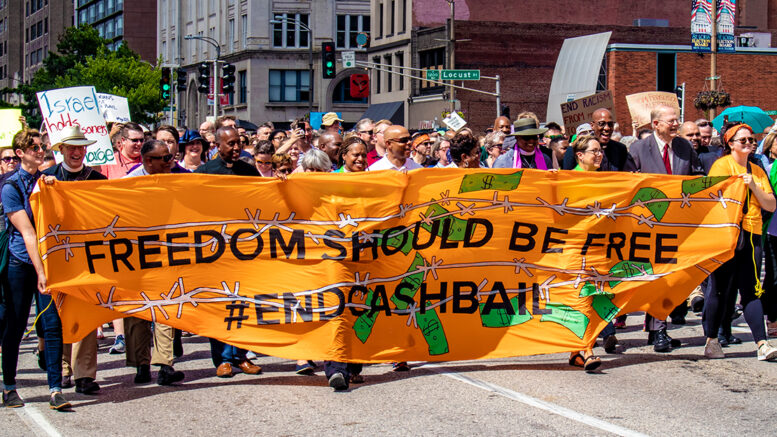On any given day in 2020, roughly 630,000 people were locked up in local jails. The majority of them had not been convicted of a crime.
After an arrest—wrongful or not—a person’s ability to leave jail and return home to fight the charges typically depends on access to money. That’s because, in virtually all jurisdictions, people are required to pay cash bail in order to secure their freedom. Originally, bail was designed to ensure people return to court to face charges against them. Now we know that simple solutions like court reminders often can achieve that purpose. And, the money bail system has morphed into one that perpetuates widespread wealth-based incarceration. The pretrial incarceration caused by unaffordable bail is the single greatest driver of convictions, and is responsible for the ballooning of our nation’s jail and prison populations.
Poorer Americans and people of color often can’t afford to come up with money for bail, leaving them incarcerated in jail awaiting trial, sometimes for months or even years. Meanwhile, wealthy people accused of the same crime can buy their freedom and return home.
Across the country, money bail is set at levels that are far too high for many people or their families to pay. Defendants face an impossible choice: remain locked up in jail as the case moves through the system; pay a nonrefundable fee to a for-profit bail bonds company; or plead guilty and give up the right to defend themselves at trial. For poorer families, paying this fee can be a significant hardship. They won’t ever get the money back regardless of the outcome of the case—even if the arrest was a case of mistaken identity and no charges were ever filed.
This bail system has increased the jail population and made America’s incarceration problem worse. According to a report by the Vera Institute for Justice, the number of annual jail admissions doubled in the past three decades to 12 million, and the average length of stay increased from 14 to 23 days.
The ACLU Campaign for Smart Justice is fighting in state legislatures and in the courts to end the unjust bail system, and is working to end the for-profit bail industry, which profits off this injustice. Current bail practices are unconstitutional because they violate the rights to due process and equal protection under the Fourteenth Amendment, the prohibition against excessive bail found in the Eighth Amendment, and the right to a speedy trial guaranteed by the Sixth Amendment.
For-profit bail bond companies and the insurance companies who back them don’t want to see changes to a system that generates revenue for them, but some states are starting to look at a smarter path forward. In New Jersey, for instance, lawmakers have imposed bail reforms that consider the individual in deciding whether someone can return home, not just how much money that person has. Illinois recently became the first state to completely abolish cash bail and invest in alternatives to promote pretrial release and success. We also saw a massive victory in February 2020, when following a pressure campaign private equity firm Endeavour Capital divested from Aladdin Bail Bonds, the then largest for-profit bail bond company in the US. This came after a multi-year campaign by ACLU Smart Justice and Color of Change pushing them and their investors to divest. Our next corporate target is Fairfax Financial, a Toronto based company which has now assumed the title of the largest owner of commercial bail in the U.S.
This approach makes the system more equitable and effective.
Source: aclu.org, 2024

